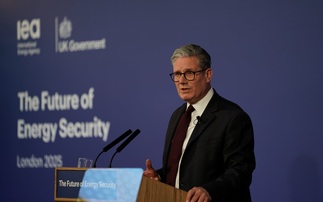As the turmoil in Westminster goes from bad to worse, Amber Rudd has given the green economy and the fight against climate change the boost it needed
As Boris Johnson walked away from his tilt at the top job having arguably contributed more than anyone else to the trashing of the UK's short term economic prospects, over on the other side of Westminster David Cameron, Amber Rudd, and the bruised band of green Tories were doing exactly the opposite, handing over a welcome leaving gift to the business community before the Prime Minister departs.
It would have been easy for the government to defer the decision on new carbon targets for the 2030s imposed through the fifth carbon budget, arguing such a crucial ruling on the future make-up of the UK's economy should be left to the next incumbent of Number 10, whoever that may be. A delay would have technically breached the Climate Change Act, but ministers could have pleaded they were facing exceptional circumstances and even then the worst that would have happened would have been an embarrassing judicial review, a bit more lost investment to add to the avalanche of lost investment already gathering pace as a result of Brexit, and some more howls of outrage from green groups.
Instead, Cameron and Rudd did the right thing. They honoured their manifesto commitment to respect the Climate Change Act and got on with the serious business of running the country in its best long term interests. The contrast with the sub-Shakespearean schoolboy antics of some of their power-crazed, post-truth colleagues is stark.
The outgoing Prime Minister and his loyal energy and climate change secretary have had an extremely tense relationship with the UK's environmental movement over the past 18 months. Cameron and Rudd do not feel they have got sufficient credit from green groups and some businesses who have criticised them at pretty much every turn, arguing privately they represent environmentalists best friends in government and highlighting publicly that they have delivered record levels of green investment. This frustration bubbled to the surface earlier this year when Cameron rejected criticism of his progress on tackling climate change as "total, utter nonsense".
In many ways, the facts bear them out. The Lib Dems played a crucial role, but over the past six years a Cameron-led government delivered record levels of renewables investment, record levels of energy efficiency improvements, and some of the deepest cuts in emissions ever recorded, all while a world-leading offshore wind industry was built and the UK emerged as key player in the electric vehicle, marine energy, and green finance markets.
However, if Cameron and Rudd felt their climate legacy was not fully appreciated they only had themselves to blame. Encouraging progress was repeatedly undermined by policy mis-steps, unjustified U-turns, chronic short termism, stifling Treasury orthodoxy, and, in echoes of the referendum defeat, a bizarre reluctance to publicly highlight the benefits of the strategy the government was pursuing. The impression of a Prime Minister too easily swayed by media pressure and not always fully across the fine point detail of modern energy and climate policy was never fully shaken.
As the Committee on Climate Change makes absolutely plain in today's necessarily softly spoken, but still rather brutal, progress report, the government is guilty of backsliding on a raft of crucial climate policy areas. Cameron and Rudd may deserve more praise from the green economy for the investment and emissions reductions they have helped deliver, but they must surely understand why surprise U-turns on carbon capture and storage, steep cuts in support for the most cost effective forms of clean energy, and the scaling back energy efficiency spending burnt through a lot of good will, especially when these moves were set against contradictory support for fracking, gas, and higher cost clean energy alternatives.
And yet in one of his final acts, Cameron appears to have come full circle and returned unequivocally to his green, husky-hugging roots.
It won't command headlines on this most eventful of days, but the approval of the fifth carbon budget is a huge deal for the UK economy. It is disappointing the budget has not been extended to cover shipping emissions (even at the last, Cameron's willingness to compromise on climate policy is apparent), but the target requires the rapid transformation of the economy over the next 15 years to the point where our power is almost completely decarbonised, our transport is dominated by low emission vehicles, our agricultural and industrial processes are transformed, and our buildings are using a fraction of the energy they do now. The world will be transformed.
The budget is also legally robust. There is a fear amongst some Remainers that the climate sceptic wing of the Brexit camp will demand some serious pay-back from the new Prime Minister, potentially putting climate policy very much in the firing line. But the approval of the fifth carbon budget means the only way to water down ambition would be to repeal the whole Climate Change Act or identify credible reasons for a slowdown in emissions reductions. Some Tory MPs will no doubt still seek to engineer this outcome, but they will face staunch opposition from many of their colleagues, the wider public, and thousands of businesses. Cameron has just put a major roadblock in the path of those who worked hardest to destroy him. Revenge, as they say, is best served cold.
Consequently, Rudd or any successor at DECC now has to deliver a suitably ambitious plan for meeting the new carbon budget, featuring detailed policies to accelerate the roll out of clean power, transport, heat, and building technologies. For all the challenges green businesses face as the current political train wreck rumbles on, a major boost to their prospects should be delivered by the end of the year. Regardless of the political leanings of the new government it is honour, duty, and legally bound to deliver on both the fifth carbon budget and the Conservative manifesto commitment to cost effective decarbonisation. In the midst of the most unstable period of many of our lifetimes, Cameron and Rudd have behaved like grown-ups and bequeathed green businesses and investors a degree of much needed stability.
There have been times in the past 18 months when it has felt to many as if Cameron and Rudd were looking to wreck crucial climate policies. But the long term strategic goal always remained consistent, and in a parting gift to both the green economy and the planet they have today started the crucial process of fixing some of the policy areas they previously damaged. Again, the contrast with the man who deposed the Prime Minister could not be starker.
David Cameron will not be remembered kindly by many environmentalists, and it is a huge shame it took until the fag end of his administration for the government to properly and officially recognise the need for much more ambitious climate policies. But in rubberstamping the fifth carbon budget the Prime Minister has underlined the fact he was ultimately a genuine and often effective supporter of climate action. The hundreds of thousands of people who work in the green economy will now be hoping whoever follows him builds on the climate legacy Cameron has left.









